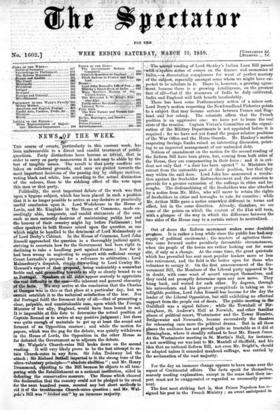NEWS e OF THE WEEK.
TIEE course of events, particularly in this current week, has been unfavourable to a direct and candid treatment of public questions. Party distinctions have become so trivial, that in order to carry on party manceuvres it is not easy to abide by the test of tangible issues. The result is that party conflicts are taken on collateral grounds, and men are guided towards the most important decisions of the passing day by oblique motives, voting black and white, less according to the actual distinction of the colours, than to the sidelong effect of the vote upon this man or that party.
Politically, the most important debate of the week was that upon a bygone subject, which has been placed in such a position that it is no longer possible to arrive at any decisive or practically useful conclusion upon it. Lord Wodehouse in the House of Lords, and Mr. Kinglake in the House of Commons, made ex- ceedingly able, temperate, and candid statements of the case, -such as men earnestly desirous of maintaining public law and the honour of their country might lay before Parliament ; but other speakers in both Houses seized upon the question as one which might be handled to the detriment of Lord Malmesbury or of Lord Derby's (china. In the House of Commons, Lord John Russell approached the question in a thoroughly judicial spirit, striving to ascertain how fur the Government had been right in declining to take a headlong part against France ; how far it had been wrong in neglecting to support with sufficient energy Count Lavradio's proposal for a reference to arbitration ; Lord lialmesbury's despatch, simply forwarding to Lord Cowley Mr. Howard's report of that proposal, being undeniably a somewhat feeble and cad-proceeding towards an ally so closely bound to us
Tortugel.' Sianiseau 40 all sides appear scarcely to appreciate the real dithoulty in the-ease--the inherent and general obscurity of the foots. , We may arrive at the conclusion that the Charles at Georges was in this or that place at a particular day, but we .cannot establish it to the technical satisfaction of the law. Nor did Portugal fulfil the foremost duty of all—that of presenting a clear, palpable, and unmistakeable case, upon which the Foreign Minister of her ally, England, would have been bound to act. It is impossible at this date to determine the actual position of Captain Rouxel or to arrive at any positive judgment ; but there was quite enough of materials to get up at least the sound and ferment of an Opposition censure ; and while the motion for papers, which was the peg for the debate, was quietly withdrawn in the House of Lords, the Opposition in the other House so far defeated the Government as to adjourn the debate.
Mr. Walpole's Church-rates Bill broke down on the second reading. It will very likely prove to be the last attempt to re- tain Church-rates in any form. Sir John Trelawny led the attack; Sir Richard Bothell imparted to it the strong tone of the ultra-voluntary principle—" absolute abolition " ; and Mr. Henry Drummond, objecting to the Bill because he objects to all tam- pering with the Establishment as a national institution, aided in defeating the conservative measure. The House which cheered the declaration that the country could not be pledged to its creed for the next hundred years, wonted any but short methods to .rid it of the troublesome Church-rates question ; and Mr. Wal- pole's Bill was "kicked out" by an immense majority.


























